#Relative Self
Text
The Paradox of Unconditional Love
From Relative to Ultimate SelfIn the pursuit of understanding love, especially unconditional love, we encounter a profound dichotomy between our relative self and our ultimate self. This journey from dualistic thinking to a non-dualistic state of being offered a rich terrain for philosophical exploration.#### Relative Self: The Duality of Love and JudgmentThe relative self operates in a world of…

View On WordPress
#Acceptance#Consciousness#Dualities#meditation#Non-Judgment#Philosophical Insight#Relative Self#Self-Awareness#Soul Awakening#Spiritual Journey#Ultimate Self#Unconditional Love
2 notes
·
View notes
Text

layout of the bamboo house from the scum villain donghua
#it's here!!!!!!!#the left and right rooms should be much wider but I've resized this so many times I can't bring myself to do it again#trying to figure out the size of things relative to other things from 3298743 screenshots was a MISTAKE but this is p close#hopefully this can be a reference for people who want it!#scum villain's self-saving system#svsss#scum villain#ren zha fanpai zijiu xitong#binghe's side room and the kitchens are in separate buildings rip to the side room being attached haha
961 notes
·
View notes
Text
political opinion: fingers should have more joints
#not my only political opinion but. currently. my most FERVENT one#ok 2nd most fervent. actual most fervent is VOTE IN THE FUCKIN MIDTERMS U FUCKER MC FUCKENING FUCKERIST#anyway. ahem. fingers. more joints. self explanatory.#(also mostly unrelated but. when i was in. .. middle school maybe? there was a period of time where i fully believed 'Fervent' referred to#a species or genus or other grouping of mammal which included ferrets#like how Crows are a member of the Corvid family? yeah i thought Ferrets were a member of the Fervents#not my proudest moment yet i find myself oddly and ferociously proud#)#((no wait wait wait wait wait wait. FEREVENTLY proud))#(((also until relatively recently i thought it was spelled Fervant but we don't need to talk about that)))
5K notes
·
View notes
Text

"I wonder where Jonathan is and if he is thinking of me! I wish he were here."
#my art#dracula#dracula daily#note to self: dd2023#mina murray#mina harker#was testing out what level of rendered i should make the animatic frames for a relatively 'polished' look without being full render#this is ok i think but not as good as id like it to be (but thats a skill issue so i need to practise more)
843 notes
·
View notes
Text
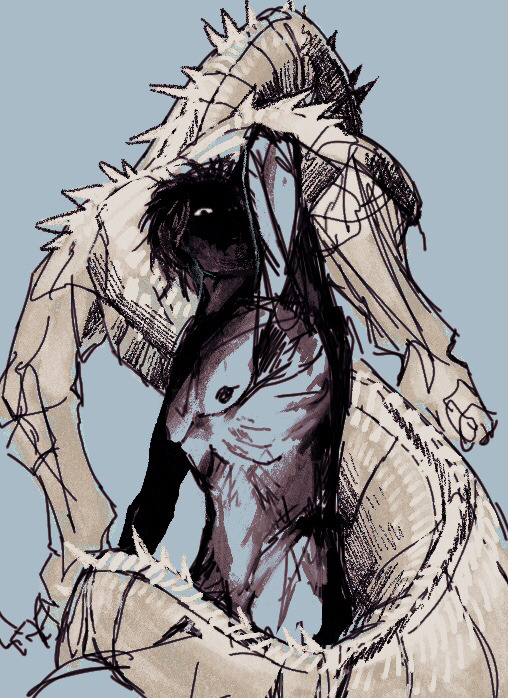
do you consider your self made?
#my art#self portrait of sorts#been musing a lot on disability recently and how being relatively freshly unable to do Most Things has changed my perspective on things#for a long time growing up i was fixated on the idea of being An Impact On The World yknow? mainly the next Big Writer#(and that it would be sooo impressive that everyone would make my books bestsellers when i was only 12 because it was That Good)#and i mean. obviously that didnt work out as originally planned because i was 12 and learning. but I've felt a lot like#I've kind of built my sense of self on those big achievements. even if they were only big to me. and a lot of them#are now out of reach or very difficult to reach. and it's been a lot to. recontextualize#to take what ive been told my whole life and ignore it in favor of just being being enough.#things will happen as they happen. i havent earned anything by suffering but it hasnt ended the world either#im here doing what i Can do for as long as I'm able to do it. and thats all i need to be for now#just making sure that i Do do the things i can do rather than assume i can do them later#anyways. love you#cw:#top nudity#artistic nudity#the dreaded ambiguously presenting nipple#if you put any pro weight loss eating disorder shit on here ill kill you btw#my body is sexy because im in it and im still alive. not because its struggling to stay that way#lindwormposting
301 notes
·
View notes
Text
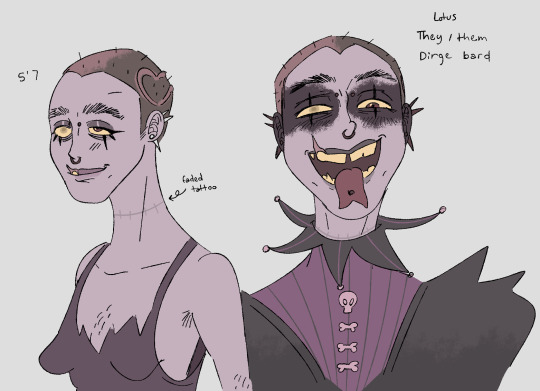
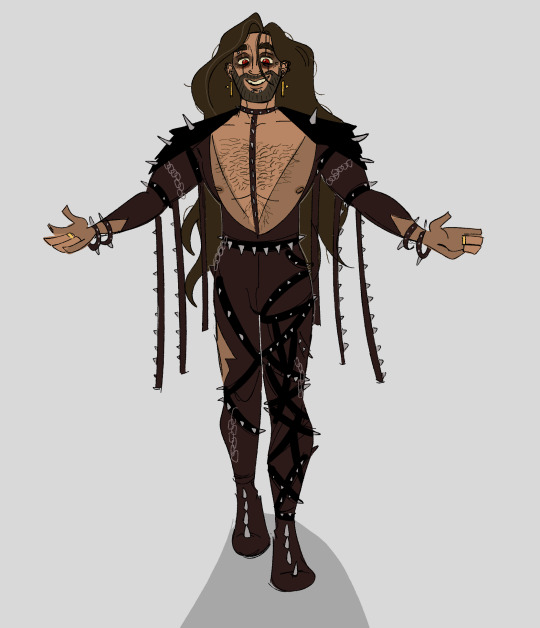
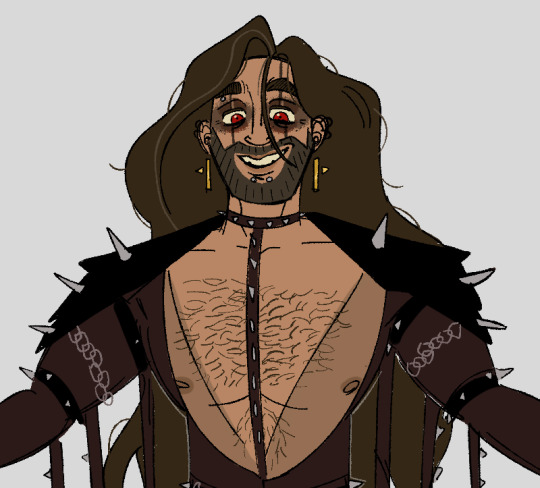
my bg3 ocs but in pathfinder wotr lol say hi to lotus and warlock 2.0 (who is an oracle so now his name is oracle here sorry not sorry)
#ive been having so much fun with this au#im just totally messing with everyones designs#only lunara is relatively her normal self HAHA#but i havent drawn her yet#pathfinder#pf wotr#pathfinder wotr#dnd#dungeons and dragons#dnd oc#dnd art#dnd bard#yes this gets dnd tags cuz theyre still my dnd ocs at the end of the day#lotus posting#warlock dude posting#oracle posting#<- he gets his own tag i guess#bob the artist
197 notes
·
View notes
Text

(Lucifer voice) Chawlie
#purely self indulgent since I actually really like her demon form#esp since the ‘full’ one is implied to not be that (her arm + her apparently having wings)#she doesn’t have half the angy clown energy that took me out while I was trying to sketch out what thisd look like#but I swear it was really funny 😔#eyestrain#ask to tag#[my art]#hazbin hotel#charlie morningstar#headcanons ……… since she looks relatively human I think it’d be interesting to explore her being very nonhuman in other ways
161 notes
·
View notes
Note
very random question and don’t feel obligated to reply but your style reminds me of dark souls/pathologic/those types of games in general. that might just be due to the historical context but i’m curious, are you a fan of games like that?
If I had to guess it could be just the vaguely historical setting, religious overtones and occasional darker themes? My knowledge on Dark Souls et al. is sparse at best, people have been telling me to give them a try but I haven't gotten around to it.
#they look really really nice and I trust it when people say the lore and storytelling is on next level#but these days I generally don't fancy games that brag on their high level of technical difficulty it's just a personal pet peeve#they make me feel like I'm being punished and that my time and effort aren't valued and that puts such a dent in my ability to enjoy them#the games I get the most out of tend to be relatively short and self contained indie experiences#with focus on storytelling ambience and unique and artsy visuals#answered#anonymous
159 notes
·
View notes
Text

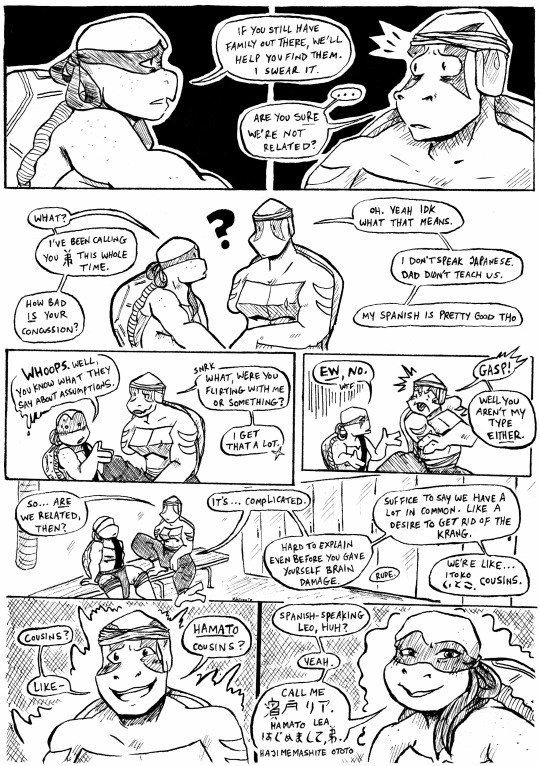
(2-3/?)
first - series
--
気楽 に行こう. (kiraku ni ikou) - Take it easy.
だいじょぶです! (daijoubu desu) - It's okay!
ご愁傷様です,弟. (go-shūshō-sama desu, ototo) - I'm sorry for your loss, little brother.
あなた は 一人 じゃない. (anata wa hitori ja nai) - You are not alone.
弟 (ototo) - Younger brother
濱戸リア (hamato lea) - Lea Hamato
はじめまして, 弟. (hajimemashite, ototo) - Nice to meet you, little brother.
#itoko apocalypse AU#any version of leonardo looking at literally any possible relative: is anyone gonna adopt that#ROTTMNT#TMNT#leonardo#TMNT 2012#TMNT crossover#turtle cousins au#save rottmnt#unpause rottmnt#rhinociart#I really gotta start doing my research first I keep finding kanji I should have used after I've already made the comic#oh well it's a learning process#note to self water-based ink is the DEVIL for this kind of thing
403 notes
·
View notes
Text




Low-poly Wolf stickers are now available in my BigCartel store
Come in three different variants: Red, Black and White, and can be bought as complete sets of 10 different stickers, or as randomly selected individual stickers
Listing link
More stickers
#i have relatively low stock of each variant for now but i will be restocking them actively based on popularity#bigcartel#art store#art for sale#stickers for sale#stickers#low poly#3d#wolf#wolves#self promotion#store#lazert#lazer-t#announcement
146 notes
·
View notes
Text
there is truly a strange disconnect between some astarion fans and not recognizing his most basic trait as being a sponge for attention.
#aristotle.txt#i think this will make people upset but its really just like#elf boy needs attention. like needs it. and a lot of it#hes spent an entire lifetime completely devoid of love and affection#not of gods not of people. nothing. not only that he is already a relatively self involved person#fundamentally that man needs adoration and romance and attention and love#like in heaps. it feels like people seek in him things that he both does not want and would not do#he is not incapable of tenderness but its going to look a lot more like allowing you to love him than it is acts of selfless romance#id argue its the most loveable / attractive aspect of his character and its like. completely overlooked somehow at the same time#its just so like. it incites so much ??? in me sometimes hehkjsdkjf
127 notes
·
View notes
Text
I’ve tried like 500 times to articulate my thoughts about nonwhite superman and how much that adds to his childhood of loneliness and every time I hit a stumbling block because the topic makes me too insane to think but please hold my hand and imagine this little boy trying to grow up in rural Kansas and being the only person he’s ever known who looks like he does. This little boy who never has a proper answer when people ask where he’s really from, and even once he knows the truth of himself he can never safely share it. Please imagine him fighting every single day to belong and never being able to no matter how hard he tries because people will always find something questionable in the very way he looks. A lot of the superman mythos is dependant on Clark’s ability to assimilate but when you take that away what is left?? He’s just a kid fighting so hard for a belonging he’ll never have a hope in hell of being handed. Oh it hurts my heart
#dc#supermanposting#sorry I genuinely ache about it#I know visibly brown Superman is a relatively common headcanon in dc fandom spaces so it gets me thinking abou#how that would change his story#especially in the comics where he isn’t told he’s adopted until the Kents need to explain to him what these power manifestations are…#this is also what my superman comic was about btw#I have so many ideas in my head about how his relationship to himself would change after moving to metropolis#and becoming superman#AND EVEN HOW THE PERCEPTION OF SUPERMAN WOULD CHANGE!!#Clark not being white adds an entire new layer to his need to remain nonthreatening enough for people to actually tolerate him#as well as the scapegoating he experiences when he’s declared foreign or out of control or threatening#and I think Clark’s ability to eventually relate to all the nonwhite and immigrant communities of metropolis would be what saves him#and saves his self esteem#there are so many beautiful people in the world just like you!!#if I had my way superman would be way more defined by his connection to marginalized communities#anyways sorry I have genuine pages of thoughts about nonwhite superman#please ask me about nonwhite Superman I love nonwhite superman#sorry I hope this all makes sense it’s very late at night
55 notes
·
View notes
Text
The term “social transition” has a non-trans history in the psychology of adolescence. In the 1980s, it was an operative metaphor for describing adolescence through the American trope of a rocky period of self-making, what one psychologist in 1978 termed “the difficulty of adolescence as a transitional period.” The primary “transition” that concerned psychologists at the time was school, where social shifts in friend groups and hierarchies from middle school to high school affected a young person’s self-esteem and mental integrity, resulting either in positive self-actualization or, if the social transition went poorly, “problem behavior.”³
The term “social transition” was only later adopted by psychologists and psychiatrists looking to powerfully expand their jurisdiction over trans youth to include entirely non-medical practices that often spur parents to reject or harm their kids: wearing a dress, cutting or growing out hair, wearing a binder or a bra, wearing makeup, or adopting a new name and pronouns. Making those banal but concrete practices of changing gender into psychiatric events was intended to convince anxious and angry parents that they shouldn’t put down their children. By the same token, tying practices of clothing and self-description to healthy development overinflated them with a pathological degree of significance, upping the ante and creating a lucrative target, both for parents of trans youth who wanted to stop their children from transitioning and, now, politicians.
I don’t mean to imply that psychiatry directly caused HB 2885, just that it clearly holds one part of the blame for inventing the root vulnerability that Gragg has taken advantage of in Missouri. If anything, the attachment of sex offender felonies to a teacher complimenting a teenager’s haircut exposes, once and for all, how fraudulent the medicalization of transition has been all along. Gragg can claim the right of the state to control children’s dress and speech (masquerading as the rights of parents) through teachers and counselors, in part, because psychiatry and medicine first claimed the right to regulate trans youth’s practices of transition.
Still, the causal events that led to HB 2885 run far deeper than the shallow history of “social transition” as an especially foolish psychiatric fiction. Here lies the far bigger problem raised by this bill. Not only will psychiatrists prove to be the least effective political allies of trans youth in Missouri, but contemporary queer and transgender culture’s elevation of the private right to dress as the sine qua non of politics is also quite useless as a political strategy.
Part of what I gather stuns in bills like HB 2885 is their audacity. The law would target the most conservative, least politically subversive of all transgender practices: individual style, identification, and language-use. In the case of minors, “social transition” is also a cheap compromise offered to young people who are refused blockers and hormones by disapproving parents and doctors, but that compromise is offered in a broader queer and transgender culture that has elevated self-identification through style as the ultimate arbiter of being transgender, making it much harder to advocate for a genuine right to transition for anyone, teenager or adult.
[...]
Students have very limited First Amendment rights on school campuses, meaning that they cannot present themselves as private individuals enjoying the right to dress as they please.⁷Their self-expression is governed from the outset by a competing set of custodians, from parents to schoolteachers, to psychiatrists and doctors, to the Missouri House of Representatives. Trans youth’s interests are therefore materially extraneous to the mainline of contemporary queer and transgender culture, whose architects were wealthy, college-educated adults whose prior enjoyment of full-citizenship was the very reason they demanded only the affirmation of a right to dress.
I suspect that part of the genuine shock of bills like HB 2885 is that most people reasoned that LGBT liberalism’s elevation of the private individual over all other political concerns would inoculate dress and language from state interference. It evidently has not. What perhaps has been misunderstood, then, is how the state exercises power. The law cannot prohibit being transgender, for there is no such state of being. The state has no need to target people’s interior selves, either, for the law can seize people where it always has, in concrete social practices that it simply declares are the undesirable traits of transgender people—namely, practices of transition.
Jules Gill-Peterson, The Unimportance of Wearing Clothes.
[emphasis added]
#antipsychiatry#psychiatry#jules gill peterson#trans#cissexism#mine#readings#i don't agree with her 100% here on the relative conservatism of social transition and advocacy for it [or the discounting of#trans virtuality writ large] but this is immensely important context through which to approach the increasing enclosure of myriad healthcar#technologies & broader technologies of 'self' from tgnc ppl#especially as she points out young ppl#adultism#ageism
55 notes
·
View notes
Text
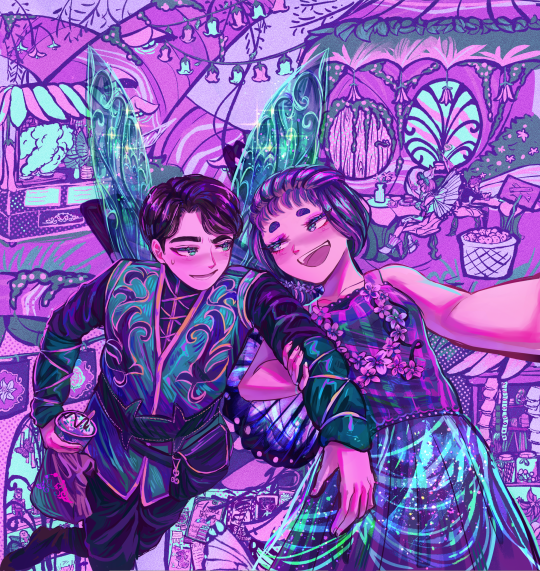



fun fact: Them
#willos nation I have an important announcement to make#eyagh *disintegrates into powder and scatters into the wind forever*#that's all thank you for coming to my ted talk.#barbie mariposa#barbie mariposa and her butterfly fairy friends#barbie mariposa and the fairy princess#Had to attach a link to the last image because tumblr fucked the quality so bad#barbie#barbie movies#On a different note. They go on chore runs together. In my mind#I should've drawn that but you're going to hear it from me here instead#She invites him out on a laundry run to cut down on the being bored out of her mind and notices he's actually enthusiastic about it#Because like. Having grown up mostly sheltered and relatively(self-imposed or otherwise) isolated he#hadn't really had the experience of just Hanging Out very much#like hell yeah an excuse to leave the palace without having to deal with socializing with strangers. too much.#because she can deal with that. And i mean. he likes hanging out with her.#So she just keeps inviting him over for other menial chores. He's actually kindof competent at it and she really doesnt mind the extra help#cakeart#Also. also. She does poses for him. to draw. paint. whatever#Not in a weird way. in a figure drawing way. understand my vision. look me in the eye.#Artist/muse scenario in general. consider. consider. i'm correct#This post has been in my drafts since november it's not going to show up in the tags if I keep talking
84 notes
·
View notes
Text
Thank you to everyone supporting the “it’s a body suit but it’s the angel equivalent of nude colored” agenda.
You understood the assignment. Best of both worlds.
#non voice post#yeah yeah bare skin is good and all#but gifts are meant to be wrapped so you can tear them open#it doesn’t mean he can’t have black/gold skin under there. we can have Both.#thank you for the consideration#guys I swear I have relatively normal posts incoming I just don’t have the time to edit them#also I have priorities#oh haha my lawyer is calling me again. gotta go.#if I have the time to I’ll edit a couple posts and queue them#cause I’m busy :p#maybe I should clarify the lawyer thing is a joke#it’s me self censoring lol#putting a hand on my own shoulder and saying ‘you should stop talking now’
102 notes
·
View notes
Note
Weird question but do you think I could put that my art was in Li’s Book of Friends on my resume? Totally cool if not I’ve just barely done anything in my life and I’m rather proud of that lol. You don’t have to answer publicly
ABSOLUTELY. It's on my resume, too!
Potential buzz word vomit: you were a "featured artist" who "coordinated with a grassroots team of over fifty international artists and writers to produce an illustrated fantasy travelogue that has raised over $3,000 USD in support of wildlife conservation."
Always list fannish works on your resume. They sounds AMAZING as long as you talk around the fandom name.
#I got my first com sci teaching job on the basis of my volunteer web site building and maintenance of an international writing forum#read: an X-Men RPG forum#similarly#yes inquisitive relatives Spouse and I met on that self-same writing forum#sssh don't ask follow up questions#Li's Book of Friends
146 notes
·
View notes